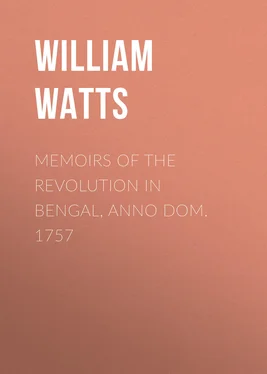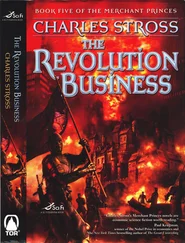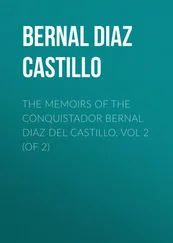William Watts - Memoirs of the Revolution in Bengal, Anno Dom. 1757
Здесь есть возможность читать онлайн «William Watts - Memoirs of the Revolution in Bengal, Anno Dom. 1757» — ознакомительный отрывок электронной книги совершенно бесплатно, а после прочтения отрывка купить полную версию. В некоторых случаях можно слушать аудио, скачать через торрент в формате fb2 и присутствует краткое содержание. Жанр: foreign_prose, История, foreign_edu, foreign_antique, на английском языке. Описание произведения, (предисловие) а так же отзывы посетителей доступны на портале библиотеки ЛибКат.
- Название:Memoirs of the Revolution in Bengal, Anno Dom. 1757
- Автор:
- Жанр:
- Год:неизвестен
- ISBN:нет данных
- Рейтинг книги:4 / 5. Голосов: 1
-
Избранное:Добавить в избранное
- Отзывы:
-
Ваша оценка:
- 80
- 1
- 2
- 3
- 4
- 5
Memoirs of the Revolution in Bengal, Anno Dom. 1757: краткое содержание, описание и аннотация
Предлагаем к чтению аннотацию, описание, краткое содержание или предисловие (зависит от того, что написал сам автор книги «Memoirs of the Revolution in Bengal, Anno Dom. 1757»). Если вы не нашли необходимую информацию о книге — напишите в комментариях, мы постараемся отыскать её.
Memoirs of the Revolution in Bengal, Anno Dom. 1757 — читать онлайн ознакомительный отрывок
Ниже представлен текст книги, разбитый по страницам. Система сохранения места последней прочитанной страницы, позволяет с удобством читать онлайн бесплатно книгу «Memoirs of the Revolution in Bengal, Anno Dom. 1757», без необходимости каждый раз заново искать на чём Вы остановились. Поставьте закладку, и сможете в любой момент перейти на страницу, на которой закончили чтение.
Интервал:
Закладка:
The Mogul , or, as we commonly call him, the Great Mogul , is, according to the Constitution of Indostan , if Despotism can with any Propriety be stiled a Constitution, as absolute as a Monarch can be. He is the sole Possessor of Property, the single Fountain of Honour, and the supreme Oracle of Justice. The whole Country belongs to him; all Honours are Personal, are bestowed by his Bounty, and resumed at his Pleasure; his Subjects having no other Laws than the Dictates of his Will. The Omrahs, or Great Lords of his Court, who discharge the high Offices in his Household, exercise the Functions of Ministers of State, or hold superior Commands in his Armies, are all Creatures of his own, and so are the Governors of Provinces, stiled in the Language of the Country Nabobs , who have again lesser Governments, to which they appoint, called Phousdaries . Thus things actually stood under the long Reign of Aurengzebe , and under the short one of his Son; but since the Days of his unfortunate Grandson, Mohammed Shah , who was dethroned, and restored by Thamas Kouli Khan , the Moguls are no more than Shadows of what they were; and their Prerogatives become rather Sounds than Substance. Those Emirs or Nabobs, who govern great Provinces, are stiled Subahs, which imports the same as Lord-Lieutenants or Vice-Roys. These Vice-Roys have ever held their Provinces of the Mogul, by rendering him a yearly Tribute, and furnishing their Contingent of Troops, when demanded for his Service; each of them exacting the like Services from their subordinate Governments; in both the Nabobs and Phousdars were supreme, and executed a kind of Sovereign Authority, subject only to those from whom it was delegated, and by whom it might be again taken away when they thought fit. But now they affect a kind of Independence, send their Tribute to Court when they esteem it convenient, and that is but seldom: and devolve their Employments on their Heirs, who having immediate Possession of the Means, find no great Difficulty in getting themselves confirmed, by making proper Presents at Delly . If the Mogul attempts to depose any of them, the Person to whom he gives the Commission must raise an Army, and force a Passage to the Government bestowed upon him with his Sword. The same thing happens with regard to the Phousdars, removed by the Suba's; and hence the Confusions that ensue, whenever the Pretenders to the same Post (who are also sometimes supported, as their Interest leads them, by the different trading Nations upon the Coast) to gratify their Ambition, create implacable, ruinous, and endless civil Wars.
As to the Gentoows , though Multitudes of them live in the Cities and Provinces governed by the Officers of the Mogul, yet in the mountainous Countries, and in some others, there are many who still maintain their Freedom, or rather are Slaves to Princes of their own, stiled Rajahs, amongst whom the Mahah Rajah, or King of the Marattes, is the most powerful. His Subjects inhabit the Mountains to the South-East of Goa , and he has sometimes brought Armies of one Hundred, and sometimes of two Hundred Thousand Men into the Field, composed mostly of Horse. These, as well as the Troops of the lesser Rajahs, of whom there are many, are employed chiefly in predatory Expeditions, and by making very rapid Incursions, and no less rapid Retreats, do a great deal of Mischief in a very little time. This has induced some of the wisest amongst the Mogul Governors to consent to the Payment of an annual Tribute, stiled the Chout, amounting to a fourth Part of the Revenue of the Province, to prevent these Inroads. The Nabobs likewise frequently entertain the Troops of these Rajahs in Pay, in order to increase the Strength of their own Armies. From this concise Account of Things, it will sufficiently appear, that the Power of the Mogul is rather nominal than real; that a kind of Anarchy reigns through the Country; and that where there is any Thing that resembles ever so imperfectly a Form of Government, it has Force for its Basis, is supported by Fraud, and that in Fact there is hardly any such thing as legal Authority subsisting in any Part of the Empire; so that to measure the Rectitude of Men's Actions in such a Country as this, and in relation to such Governors as these, by the same Rules that take Place under regular Establishments, where Laws are settled and known, and where Justice is duly administred, is not at all founded either in Reason or Equity.
The English established their Presidency at Calcutta , towards the Close of the last Century, in virtue of a Phirmaund (Firmân) from the famous Aurengzebe , who much extended the Bounds of the Empire on this Side. His Firmân was confirmed, and the Privileges of the East India Company much augmented by his great Grandson Mohammed Furruksîr . It is therefore indubitable, that having these Concessions made to them in the most ample and honourable Manner, and when the Mogul Empire was in its most flourishing Condition, the English Nation had as firm and solid a Right to their Possessions and Immunities as that Constitution could give. They were not therefore certainly to be disturbed or controuled by the Governor of the Province, while they behaved themselves peaceably and properly towards him.
The Company and the Servants of the Company had strictly observed the Terms upon which they were bestowed, and were so modest, or rather so cautious, as to keep much within the Bounds of those Concessions, and chose rather to wave some of their Rights than run the Hazard, under so unsettled a Government, of affording any Colour of Complaint. The same Spirit prevailed; the same Care was taken in all the Factories subordinate to this Presidency. When Injuries were done them, they applied to the Suba's for Relief; when the Officers of those Vice-Roys, either with or without their Knowlege, ventured upon Exactions, they proceeded by Remonstrance. If this had its Effect, they thought themselves happy; if not, they bore it with Patience, of which many Instances might be given. They knew very well that Trade was their Business, and that Disputes with the Country Government must be detrimental to their Interests; and therefore studied to avoid them. That this was really the Case, that they had no ambitious Views, that they had not the smallest Intention to perplex or to interfere with the late Suba, appears to Demonstration, from his not attempting to fix any such thing upon them; and still more so, from the Condition in which he found them.
The old Suba of the three Provinces of Bengal , Bahar , and Orixa , who had advanced himself, and seized that Dignity in the usual Way, by a fortunate Audacity, sticking at nothing to gratify his Thirst for Power, Aliverdy Cawn , died much advanced in Years, April the 9th, 1756, and was succeeded by his adopted Son Suraja Dowlat ( Sur Rajah al Dowlat ) who began his Administration with Acts of Violence, and Breach of Faith to some of his own Family; and by that time he had been a Month in Possession of the high Office he assumed, manifested his Aversion to the English .
On what his Resentment to the British Nation was founded, he was himself at a Loss to say; and the trivial, inconsistent, and in various respects ill-grounded Pretences, he afterwards suggested, as the Motives to his Conduct, evidently shew they were contrived rather to hide, than to declare the Intentions from which he really acted. It has been asserted, and very probably not without sufficient Foundation, that some who knew his violent and rapacious Disposition, made their Court to him, by representing, that the Europeans settled in the Provinces he possessed were immensely rich; that he might well expect considerable Sums from them to merit his Favour and Protection upon his Accession to the Government; that he had a Force much more than was adequate to the crushing them absolutely, if he so pleased; that by compelling them, under Colour of their coming as Merchants only into Indostan , to desist from raising any new Fortifications, he would have them always at his Mercy; and that in order to succeed effectually, and with little Trouble, he should, to prevent their making it a common Cause, break only with one Nation at a time; and first with the British , who could pay him best, and whose Submission would prove an effectual Precedent to the French and Dutch . It is not unlikely, that the Authors of this Advice might also undertake to negotiate a Compromise at a proper Juncture. This, however, is certain; that, before he proceeded to Hostilities, he had determined to reduce Calcutta , and had taken all his Measures for that Purpose, and disposed his Instruments properly with that View.
Читать дальшеИнтервал:
Закладка:
Похожие книги на «Memoirs of the Revolution in Bengal, Anno Dom. 1757»
Представляем Вашему вниманию похожие книги на «Memoirs of the Revolution in Bengal, Anno Dom. 1757» списком для выбора. Мы отобрали схожую по названию и смыслу литературу в надежде предоставить читателям больше вариантов отыскать новые, интересные, ещё непрочитанные произведения.
Обсуждение, отзывы о книге «Memoirs of the Revolution in Bengal, Anno Dom. 1757» и просто собственные мнения читателей. Оставьте ваши комментарии, напишите, что Вы думаете о произведении, его смысле или главных героях. Укажите что конкретно понравилось, а что нет, и почему Вы так считаете.












